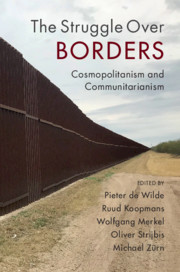28 results
Copyright page
-
- Book:
- The Struggle Over Borders
- Published online:
- 28 June 2019
- Print publication:
- 04 July 2019, pp iv-iv
-
- Chapter
- Export citation
References
-
- Book:
- The Struggle Over Borders
- Published online:
- 28 June 2019
- Print publication:
- 04 July 2019, pp 249-264
-
- Chapter
- Export citation
Contents
-
- Book:
- The Struggle Over Borders
- Published online:
- 28 June 2019
- Print publication:
- 04 July 2019, pp v-vi
-
- Chapter
- Export citation
Figures
-
- Book:
- The Struggle Over Borders
- Published online:
- 28 June 2019
- Print publication:
- 04 July 2019, pp vii-viii
-
- Chapter
- Export citation
Index
-
- Book:
- The Struggle Over Borders
- Published online:
- 28 June 2019
- Print publication:
- 04 July 2019, pp 265-276
-
- Chapter
- Export citation
Contributors
-
- Book:
- The Struggle Over Borders
- Published online:
- 28 June 2019
- Print publication:
- 04 July 2019, pp xi-xi
-
- Chapter
- Export citation
8 - Conclusion: The Defects of Cosmopolitan and Communitarian Democracy
- from Part III - Conclusion
-
-
- Book:
- The Struggle Over Borders
- Published online:
- 28 June 2019
- Print publication:
- 04 July 2019, pp 207-237
-
- Chapter
- Export citation
Appendices
-
- Book:
- The Struggle Over Borders
- Published online:
- 28 June 2019
- Print publication:
- 04 July 2019, pp 238-248
-
- Chapter
- Export citation
Part I - Domestic Impacts
-
- Book:
- The Struggle Over Borders
- Published online:
- 28 June 2019
- Print publication:
- 04 July 2019, pp 35-116
-
- Chapter
- Export citation
Part III - Conclusion
-
- Book:
- The Struggle Over Borders
- Published online:
- 28 June 2019
- Print publication:
- 04 July 2019, pp 205-237
-
- Chapter
- Export citation
Tables
-
- Book:
- The Struggle Over Borders
- Published online:
- 28 June 2019
- Print publication:
- 04 July 2019, pp ix-x
-
- Chapter
- Export citation
Part II - Supranational and Cross-Level Analyses
-
- Book:
- The Struggle Over Borders
- Published online:
- 28 June 2019
- Print publication:
- 04 July 2019, pp 117-204
-
- Chapter
- Export citation

The Struggle Over Borders
- Cosmopolitanism and Communitarianism
-
- Published online:
- 28 June 2019
- Print publication:
- 04 July 2019
14 - Challenges of Inequality to Democracy
- from Political Regulation, Governance, and Societal Transformations
-
-
- Book:
- Rethinking Society for the 21st Century
- Published online:
- 05 July 2018
- Print publication:
- 19 July 2018, pp 563-596
-
- Chapter
- Export citation
The Dynamics of Democratization: Dictatorship, Development, and Diffusion. Edited by Nathan J. Brown. Baltimore: Johns Hopkins University Press, 2011. 344p. $65.00. - Determinants of Democratization: Explaining Regime Change in the World, 1972–2006. By Jan Teorell. New York: Cambridge University Press, 2010. 220p. $95.00 cloth, $29.99 paper.
-
- Journal:
- Perspectives on Politics / Volume 10 / Issue 4 / December 2012
- Published online by Cambridge University Press:
- 19 December 2012, pp. 1005-1007
- Print publication:
- December 2012
-
- Article
- Export citation
List of Contributors
-
-
- Book:
- Rule of Law Dynamics
- Published online:
- 05 July 2012
- Print publication:
- 18 June 2012, pp xi-xiv
-
- Chapter
- Export citation
1 - Measuring the Quality of Rule of Law
- from Part I - Rule of Law at the International, National, and Transnational Levels
-
-
- Book:
- Rule of Law Dynamics
- Published online:
- 05 July 2012
- Print publication:
- 18 June 2012, pp 21-47
-
- Chapter
- Export citation
List of figures
-
- Book:
- The Future of Representative Democracy
- Published online:
- 05 June 2012
- Print publication:
- 31 March 2011, pp vii-vii
-
- Chapter
- Export citation
Acknowledgements
-
- Book:
- The Future of Representative Democracy
- Published online:
- 05 June 2012
- Print publication:
- 31 March 2011, pp xiii-xiv
-
- Chapter
- Export citation
Frontmatter
-
- Book:
- The Future of Representative Democracy
- Published online:
- 05 June 2012
- Print publication:
- 31 March 2011, pp i-iv
-
- Chapter
- Export citation



